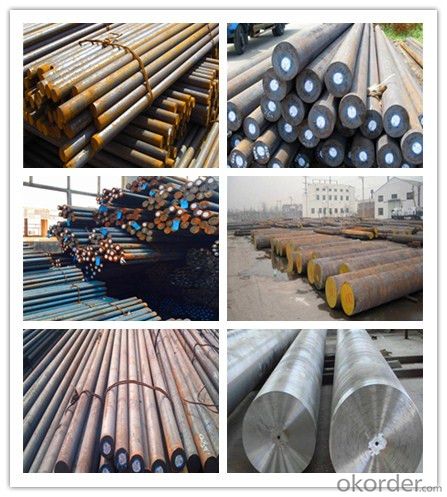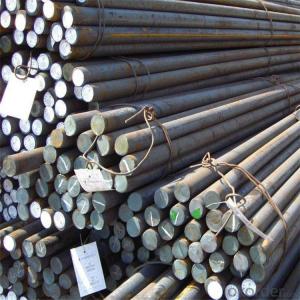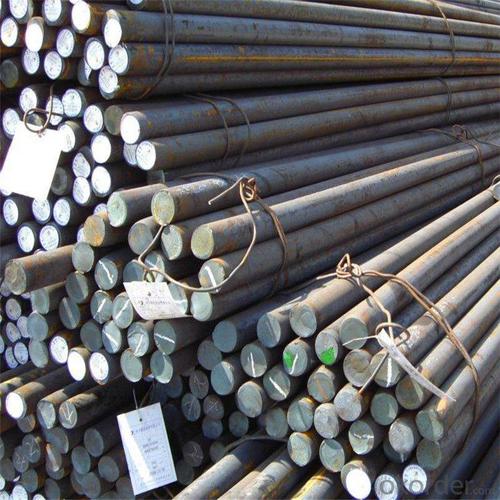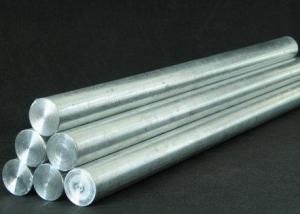Annealing Peeling Bearing Steel SUJ2 Bars
- Loading Port:
- Shanghai
- Payment Terms:
- TT OR LC
- Min Order Qty:
- 100 m.t.
- Supply Capability:
- 50000 m.t./month
OKorder Service Pledge
OKorder Financial Service
You Might Also Like
Specification
Annealing Peeling Bearing Steel SUJ2 Bars
Product Description of Annealing Peeling Bearing Steel SUJ2 Bars
1. Steel grade: ASTM52100, SUJ2, 100Gr6,GCr15
2. Length: 6M-12M
3. Diameter: 16mm-300mm
4. Product range: round bar, flat bar, square bar,wire rod, sheet
5. Technique: Hot rolled, forged, cold drawn
Specification of Annealing Peeling Bearing Steel SUJ2 Bars
Material | SUJ2 | Round bar | Dia(mm) | 10-300mm |
Process | EAF + LF + VD + Forged + Heat Treatment (optional) | Length (mm) | Max 12m | |
Heat treatment | Normalized / Annealed / Quenched / tempered | Flat bar | Thickness(mm) | 8-500mm |
Delivery condition | Hot forged +Rough machined (black surface after Q/T)+ Turned (optional) | Width(mm) | 70-200mm | |
Test | Ultrasonic test according to SEP 1921-84 D/d | Length (mm) | Max 12m |
Chemical Composition of Annealing Peeling Bearing Steel SUJ2 Bars
C | Si | Mn | Cr | Ni | Mo | P | S |
0.95~1.05 | 0.15~0.35 | 0.25~0.45 | 1.40~1.65 | ≤0.30 | ≤0.10 | ≤0.025 | ≤0.025 |
Photo Show of Annealing Peeling Bearing Steel SUJ2 Bars

Packing and Delivery:
Packing in bundle package, or as customer's requirements.
Delivery Detail: 45 days after receiving the deposit.
Usage and Applications of Annealing Peeling Bearing Steel SUJ2 Bars
1. Steel round bar is used in a large number of architectural and engineering structures. Or it can be used in construction of plants for the production of steel house frames, high-voltage transmission towers, bridges, vehicles, boilers, containers, ships, etc.
2. And we can use this kind of product on the performance of the mechanical parts if the demand is not very high.
3. Some special material steel round bar can be used for main shaft of steamer, hummer shank, with big section and supper force.
Company Information
CNBM International Corporation is the most important trading platform of CNBM group.
Whith its advantages, CNBM International are mainly concentrate on Cement, Glass, Iron and Steel, Ceramics industries and devotes herself for supplying high qulity series of refractories as well as technical consultancies and logistics solutions.


F A Q
1, Your advantages?
professional products inquiry, products knowledge train (for agents), smooth goods delivery, excellent customer solution proposale
2, Test & Certificate?
SGS test is available, customer inspection before shipping is welcome, third party inspection is no problem
3, Factory or Trading Company?
CNBM is a trading company but we have so many protocol factories and CNBM works as a trading department of these factories. Also CNBM is the holding company of many factories.
4, Payment Terms?
30% TT as deposit and 70% before delivery.
Irrevocable L/C at sight.
5, Trading Terms?
EXW, FOB, CIF, FFR, CNF
6, After-sale Service?
CNBM provides the services and support you need for every step of our cooperation. We're the business partner you can trust.
For any problem, please kindly contact us at any your convenient time.
We'll reply you in our first priority within 24 hours.
- Q: How do steel round bars compare to aluminum round bars?
- Steel round bars are generally stronger and more durable than aluminum round bars. They have a higher tensile strength, making them suitable for heavy-duty applications that require high levels of strength and resistance to bending or deformation. Aluminum round bars, on the other hand, are lighter and more corrosion-resistant, making them ideal for applications that prioritize weight reduction and resistance to exposure to harsh environments. The choice between steel and aluminum round bars ultimately depends on the specific requirements of the application.
- Q: What are the advantages of using steel round bars in construction?
- There are several advantages of using steel round bars in construction. Firstly, steel round bars offer exceptional strength and durability, making them ideal for supporting heavy loads and withstanding harsh weather conditions. Secondly, they are highly resistant to corrosion, ensuring long-lasting and low-maintenance structures. Additionally, steel round bars can be easily customized and shaped to fit various construction needs, allowing for flexibility in design. Lastly, steel round bars are readily available and cost-effective, making them a preferred choice for construction projects.
- Q: Difference between round bar and other steel bars
- It is divided into three kinds: hot rolling, forging and cold drawing. Round steel (grade 1 steel) belongs to ordinary low carbon steel, and most other steel bars are alloy steel. Round steel is of low strength and high strength of other steel.
- Q: How do you measure the straightness of a steel round bar?
- One common method to measure the straightness of a steel round bar is by using a straight edge or a precision ruler. By placing the straight edge along the length of the bar and observing any gaps or deviations between the two, one can determine the straightness. Additionally, a laser alignment tool can also be used to measure and identify any bends or irregularities in the bar's straightness.
- Q: Can steel round bars be used as axles or shafts?
- Yes, steel round bars can be used as axles or shafts due to their high strength, durability, and ability to withstand heavy loads and torque. They are commonly used in various industries such as automotive, marine, and construction for their excellent mechanical properties and reliability.
- Q: What are the different types of steel round bars used in the manufacturing of tools?
- There are several different types of steel round bars that are commonly used in the manufacturing of tools. Each type of steel has its own unique properties and characteristics that make it suitable for different applications. Here are some of the most common types of steel round bars used in tool manufacturing: 1. Carbon Steel Round Bars: These are the most commonly used type of steel round bars in tool manufacturing. They are known for their high strength and durability, making them ideal for heavy-duty applications. Carbon steel round bars can be further classified into low carbon, medium carbon, and high carbon steel, depending on the amount of carbon content present. 2. Alloy Steel Round Bars: Alloy steel round bars are made by adding various alloying elements such as manganese, chromium, nickel, or molybdenum to carbon steel. This results in enhanced strength, hardness, and resistance to wear and tear. Alloy steel round bars are commonly used in the manufacturing of cutting tools, drills, and gears. 3. Stainless Steel Round Bars: Stainless steel round bars are known for their corrosion resistance and high tensile strength. They are commonly used in the manufacturing of tools that require resistance to rust, such as kitchen knives, surgical instruments, and automotive components. 4. Tool Steel Round Bars: Tool steel round bars are specifically designed to be used in the manufacturing of tools, hence the name. They have high hardness, wear resistance, and toughness, making them ideal for applications such as cutting, drilling, and shaping. Tool steel round bars can be further classified into several types based on their specific properties, such as high-speed steel (HSS), cold work steel, hot work steel, and shock-resistant steel. 5. Stainless Tool Steel Round Bars: Stainless tool steel round bars combine the characteristics of stainless steel and tool steel. They offer good resistance to corrosion and wear, making them suitable for applications where both properties are required, such as in the manufacturing of molds and dies. These are just a few examples of the different types of steel round bars used in tool manufacturing. The choice of steel depends on the specific requirements of the tool and the application it will be used for.
- Q: Can steel round bars be used for tooling applications?
- Yes, steel round bars can be used for tooling applications. Steel round bars are often chosen for tooling applications due to their high strength, durability, and ability to withstand heavy loads and wear. They can be machined, shaped, and heat-treated to meet specific tooling requirements, making them versatile and suitable for various tooling applications.
- Q: What is the cost of steel round bars compared to other materials?
- The price of steel round bars can differ depending on various factors, including the grade of steel, the bar's size and dimensions, and market conditions. However, in general, steel round bars are usually more economical than other materials commonly used in construction and manufacturing. For example, when compared to materials like aluminum or titanium, steel round bars are typically more affordable. Steel is widely available, making it a cost-efficient choice for many applications. Additionally, steel possesses excellent strength and durability attributes, making it a preferred material for structural purposes. In contrast to materials like wood or plastic, steel round bars may be initially more costly. Nevertheless, when considering the long-term advantages such as its longevity, resistance to corrosion, and minimal maintenance requirements, steel still provides a cost-effective solution. It is important to note that the price of steel round bars can significantly vary depending on market conditions, including the availability of raw materials and the demand for steel products. Additionally, specialized or high-grade steel alloys may come at a higher cost due to their specific properties or manufacturing processes. To summarize, steel round bars generally offer a cost-effective option compared to many other materials used in construction and manufacturing. However, it is always advisable to research current market prices and consider specific project requirements before making any final cost assessments.
- Q: What is the maximum length available for steel round bars?
- The maximum length available for steel round bars can vary depending on the supplier and the specific requirements, but typically it can range from 12 to 24 feet.
- Q: What is the maximum nitrogen content allowed for steel round bars?
- The maximum nitrogen content allowed for steel round bars varies depending on the specific steel grade and application requirements. However, in general, the nitrogen content is typically limited to around 0.025-0.035% to maintain the desired mechanical properties and avoid detrimental effects on the material's performance.
Send your message to us
Annealing Peeling Bearing Steel SUJ2 Bars
- Loading Port:
- Shanghai
- Payment Terms:
- TT OR LC
- Min Order Qty:
- 100 m.t.
- Supply Capability:
- 50000 m.t./month
OKorder Service Pledge
OKorder Financial Service
Similar products
Hot products
Hot Searches
Related keywords






























